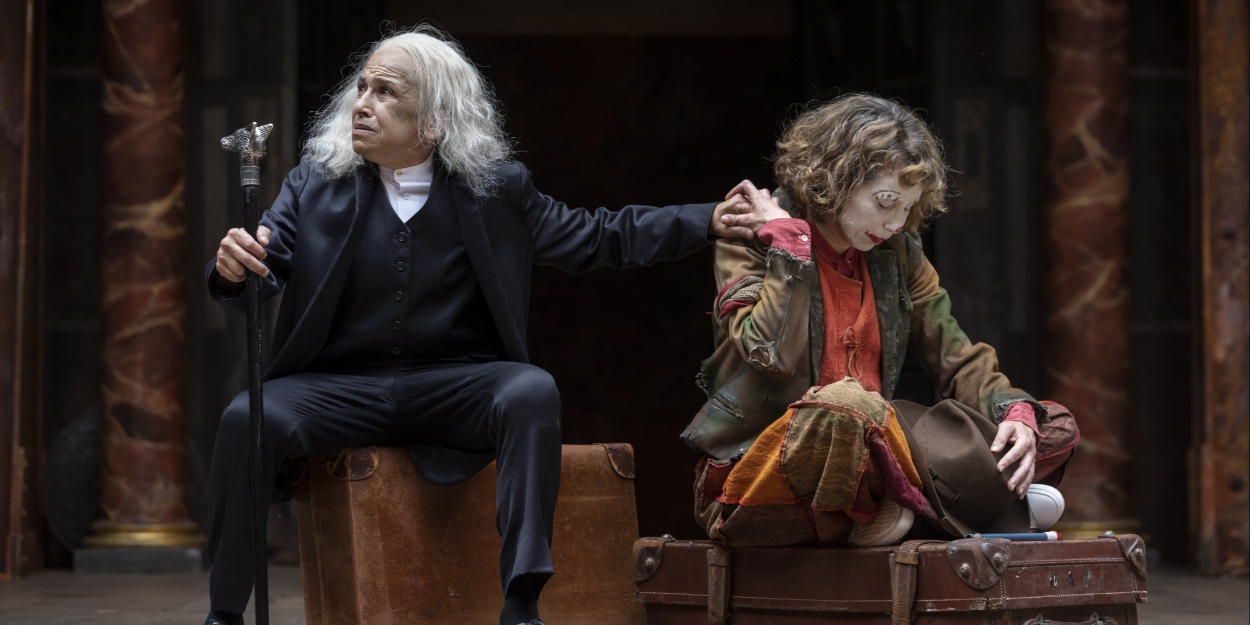Review: KING LEAR, Shakespeare's Globe
Kathryn Hunter gloriously returns as King Lear 25 years after being the first woman to play the role.

![]() Many great performers tackle Lear every year. From Laurence Olivier and Michael Gambon to Ian McKellen and Simon Russell Beale, it's become somewhat of a tradition for dramatic actors to take on one of Shakespeare's biggest challenges once their hair starts to grey.
Many great performers tackle Lear every year. From Laurence Olivier and Michael Gambon to Ian McKellen and Simon Russell Beale, it's become somewhat of a tradition for dramatic actors to take on one of Shakespeare's biggest challenges once their hair starts to grey.
Less often, a female actor comes onto the scene to huge acclaim. Glenda Jackson did so last in a starred performance on Broadway in 2019, but Kathryn Hunter is taking the wretched crown back after her first stint as the destitute monarch 25 years ago.
Her interpretation is less old-man-yells-at-cloud and more eccentric-ruler-traumatises-daughters-then-goes-bonkers. The production survived quite the setbacks with director Helena Kaut-Howson involved in a car accident two weeks before opening, Marcello Magni having to bow out of the role of Kent (but staying on as creative collaborator), and a few cancelled performances.
A King is ready to divide his land among his three children and this division will depend on their declarations of love. Goneril and Regan flatter him with flourished speeches, but when Cordelia's time comes up, she doesn't have much to say.
Enraged by his favourite child's betrayal, Lear disinherits and banishes her alongside the Earl of Kent, who has taken her side. Once they have what they wanted, Goneril and Regan cannot cope anymore with their parent's erratic behaviour and turn him away from their homes. Chaos ensues, families fracture, the kingdom edges a civil war, and nobody lives happily ever after.
Kaut-Howson's vision of King Lear is one of faded grandeur. An empty throne with a golden cape draped on the back welcomes the crowd as the musicians entertain them. Once the opulent painted backdrop opens, Lear's entourage pushes Hunter out on a wheelchair while a fanfare plays.
While she is tiny and diminished on the royal seat, her presence is spectacular. White hair and a stooping, limping figure, she introduces an unreasonable, hot-headed, androgynous Lear. The chair is always on hand and her walking stick is mainly brandished in fury against the weather, and scorn against her dissenters.
Ann Ogbomo is Goneril and Marianne Oldham is Regan. One stately and regal, the other mellifluously strategic and unforgiving. They cultivate the relationship between Lear's older daughters with subtle sweetness, establishing a sisterhood that's ultimately broken by jealousy and miscommunication.
They resent Cordelia's place as their father's crown jewel and, while seemingly unbothered by his explosions of rage and irrationality, are deeply upset by their outcomes. While Ogbomo is an exceptionally controlled Goneril, Oldham finds a Regan that's much closer to her dad's senseless outbursts, which becomes particularly evident during Gloucester's (Diego Matamoros) interrogation and sadistic blinding.
They're joined by the Artistic Director herself, Michelle Terry, as their younger, ethics-bound daughter. Terry also plays the Fool in a fascinating double-casting as both of Lear's most-loved companions. Her Fool takes over in Joker-ish makeup, carrying silly tunes and chirping prophecies alongside her character's damning observations.
Lear's court, permeated by so many shades of betrayal, sees a Hozier-looking, magnetic Edmund in Ryan Donaldson, who steals the scene, towering over the dukes and earls with natural charisma.
It's a fairly didactic production that doesn't stray much from the idea of King Lear. It does, however, lean into the comedy side of it a bit more both in textual emphasis and delivery. Max Keeble appears as the principal comedic relief, clutching his glasses while being kicked around as Burgundy and Oswald.
Hunter, too, is a backhandedly funny Lear. Her "Blow, winds" speech - played after the company members move props as if they were animated by the wind - is quite the comical struggle as she leans against an impalpable gale. She and Terry are almost immobilised and make their way down-stage slowly, with Hunter threatening the gods with her cane.
The musicians act as the storm, thumping on percussions like they probably would have in Shakespeare's time. While it's a rather traditional piece, the setting is kept significantly broad. Pawel Dobrzycki covers a lot of the Globe's iconic timber with rusted iron beams and cloth - perhaps hinting at a sort of impending industrial revolution.
That's what Kaut-Howson's take dwindles down to, a battle among generations and a fight for progress. The characters all have a distinctive colour-coded style, especially the daughters. The costumes weave together ambiguous period elements such as ruffs, breastplates, and capes with more modern suits and attire (Goneril's outfits are the stuff of dreams!).
It's a lengthy King Lear, ringing in at over three hours including an interval. It's got its exciting moments as well as its lulls, but the performances alone are worth sinking into the Globe's horribly uncomfortable wooden benches for that long.
King Lear runs at Shakespeare's Globe until 24 July.
Reader Reviews

Videos

